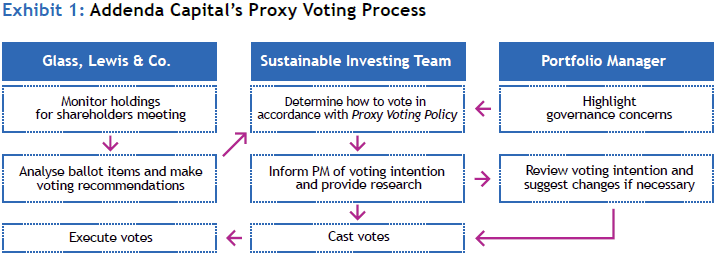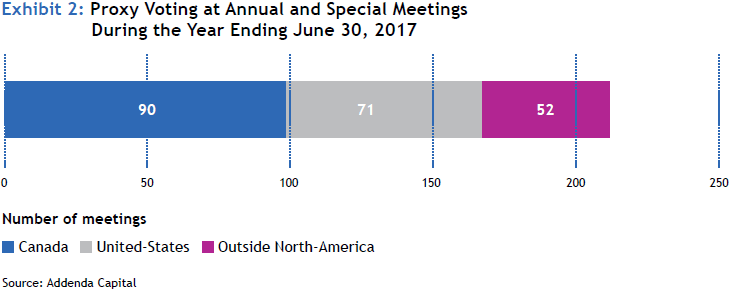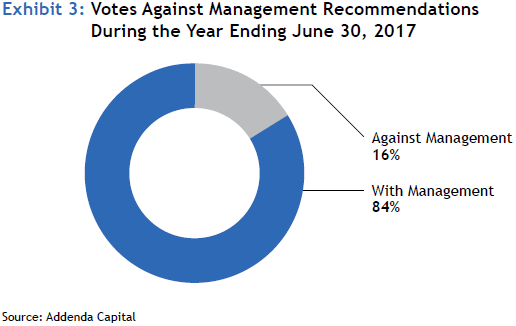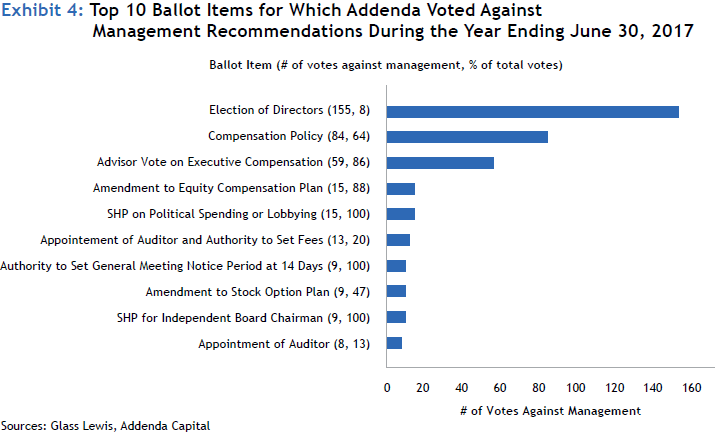Published on: February 28, 2018
Enhancing Investments' Long-Term Value through Voting and Engagement
Addenda Capital is committed to active investment management and so effectively monitors investee entities, including their ESG (environmental, social, governance) practices. This oversight allows us to actively protect and enhance the long-term interests of shareholders and other stakeholders through stewardship activities that fall under two categories: proxy voting and corporate engagement. Please consult our Proxy Voting Policy and our Stewardship Policy for further details.
1. Voting: A Key Component of Sustainable Stewardship
The right to vote at annual and special meetings is one of a shareholder's most important rights. By voting at shareholder meetings, Addenda Capital aims to affect governance, communicate preferences and signal confidence or lack of confidence in a company's management and oversight.
Evidence shows that companies that have good corporate governance are likely to sustainably generate more long-term value for their shareholders and other stakeholders.
The majority of annual meetings take place during the first half of the calendar year. For example, between July 1, 2016 and June 30, 3017, Addenda Capital voted at 213 meetings and of these over 90% took place between January and June.
Proxy Voting: Our Process Addenda usually votes "by proxy" by instructing someone to vote our clients' shares in accordance with our instructions which are based on our Proxy Voting Guidelines. We will, if necessary, attend a meeting to vote in person.

All year long, we monitor the environmental, social and governance ("ESG") practices of the entities in which we invest. During voting season, we also enlist the help of Glass, Lewis, & Co., an independent investment research firm that provides global proxy advisory and voting services.
We consider each ballot item and determine how to vote in a manner consistent with the guidelines outlined in Exhibit 1 (see page 1). In addition, we engage the entities in which we invest and policy makers in a dialogue when warranted.
Highlights from the 2017 Voting Season
During the 12 months ending June 30, 2017, Addenda Capital voted at 213 meetings. 76% of those meetings were held in North America, including 42% in Canada (see details in Exhibit 2 below).

In total, we were presented with 2,995 proposals. On about 16% of all ballot items, we voted against management or board recommendations (see Exhibit 3). Voting against management recommendations is not in itself an effective measure of our voting process. But it does highlight our willingness to vote in the best interest of our clients and our ability to effectively and critically analyze each ballot item.
Most often, when we voted against management recommendations, the proposal was about the election of directors (see Exhibit 4). For this type of ballot item, we cast 155 votes against management recommendations, which corresponds to 8% of a total of 1,902 nominees that we voted on. We opposed the nominees for various reasons including a lack of independence on a board, a nominee’s apparent lack of effective oversight on another board or the appearance of too many commitments to fulfill their duties as a director.


Policy Development: SEC Staff Legal Bulletin on Shareholder Proposals
Released on November 1, 2017, this legal bulletin provides guidance on rules that affect shareholder proposals. The Sustainable Investing Team at Addenda Capital monitors these types of policy changes as they influence the ability of shareholders to file proposals and of investors to express their views through proxy votes. The legal bulletin provides guidance on the following rules:
1. Rule 14a-9(i)(7)
This rule allows a company to exclude a proposal which "deals with a matter relating to the company's ordinary business operations."
2. Rule 14a-8(i)(5)
This rule allows a company to exclude a proposal if it is "related to operations which account for less than 5% of the company's total assets" or "for less than .5% of its net earnings and gross sales for its most recent fiscal year".
3. Rule 14a-8(d)
This rule can be used by a company board to exclude a shareholder proposal if it, "including any accompanying supporting statement" exceeds 500 words.
As a result of this guidance, we may see a reduced number of shareholder proposals reaching ballots in the upcoming year.
Vote Examples
Below are two examples of votes from this past voting season.
Approval of Executive Compensation
| Company |
FedEx Corporation |
| Addenda's Proxy Voting Policy issues |
Oppose executive compensation that contains any of the following major
- overuse of absolute metrics because they may reflect economic or industry factors beyond the control of executives;
- the use of a single performance metric for incentive programs.
Oppose executive compensation that contains a combination of any two of the following:
- lack of a clawback provision;
- executives granted supplemental discretionary awards outside the normal incentive plan;
- lack of requirement that a portion of executives' annual cash bonus be deferred into shares.
|
| Addenda's Vote |
Vote Against |
| Rationale |
It is not clear that executive compensation sufficiently ties pay with performance in a manner that aligns executives with the long-term interests of the company. For example:
- The use of absolute metrics for the short- and long-term incentive programs may not be appropriate as it may reflect economic or industry factors beyond the control of executives. Performance conditions should include relative targets.
- The use of a single metric for each of the short-term and long-term incentive programs may not be appropriate. Performance related compensation should be linked to a variety of specific objective measures of the company's operational and financial performance.
- The company's incentive plans do not appear to have a clawback provision that would enable the company to recoup bonus awards in the event of material fraud or misconduct by the recipient of a bonus award.
- The company provides accelerated vesting of certain equity awards upon a change in control rather than requiring that an executive also lose their position.
- Executives were granted supplemental awards outside the normal incentive plan, which may undermine the regular plan or indicate it is poorly designed.
|
| Result |
3.9% of votes were cast against this proposal. |
Shareholder Proposal Regarding Board Diversity
| Company |
Constellation Software Inc. |
| Addenda's Proxy Voting Policy |
Diversity on boards: Support director recruitment processes and director nominations that enhance board effectiveness by inducing adequately diverse boards. Aspects of diversity to be considered include gender, professional experience, education and ethnicity. |
| Addenda's Vote |
Vote for (against management) |
| Rationale |
Improved disclosure of the company's director diversity policies and practices could help with the evaluation of related risks and opportunities. The company lags its peers and best practice with regard to the diversity of its board. |
| Result |
42.03% of votes were cast for this shareholder proposal. |
2. Engagement Examples: Taking Care of Your Investments
Our corporate engagement activities involve purposeful dialogue with investee entities on important matters identified through monitoring, and on matters that are the subject of votes at shareholder meetings.
We may further engage with company management on issues we feel strongly about or if we have specific concerns about a company's strategy, performance, governance, compensation or approach to risks.
If the company is unresponsive or unable to address our concerns in a manner that helps to optimize long-term value, we may file a shareholder proposal or sell the security.
Below are a few examples of engagement activities Addenda conducted between July 2016 and June 2017.
G4S
We had a call with G4S's Heads of Investor Relations and Corporate Social Responsibility (CSR) shortly after quarter end to discuss the culture of the firm, health and safety practices and recent controversies. We like that the company has a board level CSR committee with 3 non-executive directors. The company also performs a bi-annual materiality exercise to define the group's priorities and material issues, which is then used to develop the CSR strategy and reporting. The group also launched an enhanced global whistleblowing process and case management system in September 2015. With regards to controversies, they believe they are not systematic in nature. Reputation is an important consideration during portfolio rationalization — Israel operations and UK youth operations were divested in part due to reputation risks.
Canadian Natural Resources
We met with the management of several energy sector portfolio companies in November 2016 to discuss their climate change strategies and their outlook for oil demand and to encourage them to consider a low oil demand scenario. Canadian Natural Resources is one of the companies we engaged with. They have incorporated climate considerations in stress testing of 3, 5 and 10 year plans in annual strategy sessions. Their focus is on what can be controlled internally rather than outside factors. They see the transition from coal to gas for electricity as positive. They are of the view that there will be growth in all forms of energy in order to continue to pull people out of poverty globally. They have an internal cost of carbon used for capital allocation decisions. They think that oil demand will be higher in 2040 than it is now.
PepsiCo
This year, nutrition was a hot topic for our food and beverage sector portfolio holdings. Letters were sent to Coca-Cola, Mondelez, Danone, Nestle, and PepsiCo in order to encourage them to do more to address obesity, diet-related chronic diseases and undernutrition. We believe companies that are applying strong nutrition policies and practices globally are better positioned to reduce the risk of increasing food and beverage industry regulation and to take full advantage of changing consumer trends towards healthier living.
Good nutrition policies and practices are integral to food & beverage companies' overall business and financial performance and long term sustainability.
In addition to these letters, we participated in a call with PepsiCo regarding responsible marketing and nutrition.
The company has implemented the following goals to be achieved by 2025:
• Over 2/3 of global beverage portfolio volume will have less than 100 calories from added sugars per serving.
• Over 3/4 of global foods portfolio volume will have less than 1.1 grams of saturated fat per 100 calories.
• Over 3/4 of global foods portfolio volume will have .less than 1.3 milligrams of sodium per calorie.
PepsiCo's policies are very robust and clear surrounding what will and won't be advertised to children.
For example, no carbonated beverages are advertised to children under 12 years old. Digital is a challenging space for the industry, as it is hard to measure who is viewing ads.
Conclusion
Our stewardship activities, including casting votes and engaging with companies, allows us to actively protect and enhance the long-term interests of our clients and other stakeholders.